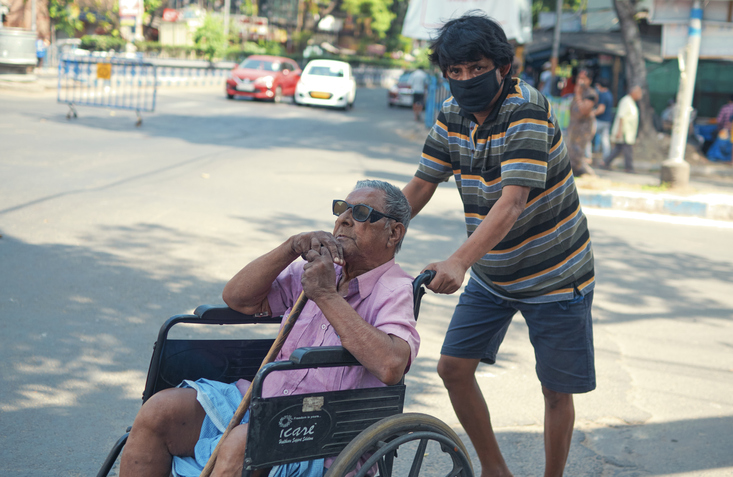
COVID-19, Persons with Disabilities and an (Un)Inclusive Healthcare System
Advocating for systemic change to ensure an accessible 'human' healthcare system
Setting the context
India’s disability rights law, the Rights of Persons with Disabilities Act, 2016 is a strong legislation which guarantees free healthcare, barrier-free access to healthcare and priority in delivering healthcare services to those with disabilities. These guarantees, unfortunately, remain confined to paper. This gap between what is and what should be, as far as the right to healthcare of those with disability is concerned, was further exacerbated by the pandemic. Conducted in collaboration with the National Centre for Promotion of Employment for Disabled People (‘NCPEDP’), the aim of this study is to generate evidence to fill this gap.
This project aims to examine the effect of the pandemic on persons with disabilities in relation to healthcare services. While multiple studies have been conducted on the effect of COVID-19 on the disabled, there is relative paucity of data on the accessibility of COVID-19 vaccines and healthcare to the disabled. Therefore, we attempted to study the following issues from the standpoint of the disabled: accessibility of healthcare services during the pandemic, accessibility of the CoWIN platform and accessibility of COVID-19 vaccinations for persons with disabilities and, finally, but importantly, accessibility of governmental communications on COVID-19.
We hope that this study can be further employed to improve healthcare services for persons with disabilities through evidence-based policymaking.
Our findings
Out of 146 respondents who responded to the question on accessibility to healthcare services, 33.5% stated that they found such services inaccessible during the pandemic. 69.5% of the total 239 respondents stated that they were able to register themselves on the CoWIN platform. However, out of the 69.5% of the respondents who could register themselves, only 33.1% did not require external support, while the remaining respondents had to rely on external help to register themselves for the vaccination. Out of the total number of persons who could get vaccinations, 52.8% were able to avail the vaccination on a priority basis. 87.7% of the respondents stated that they did not have the opportunity to access door-to-door vaccination.
Recommendations and way forward
Our recommendations flowing from this study are at two levels: (a) recommendations that specifically relate to the current pandemic; and (b) recommendations for creating a disabled friendly health system.
Accessibility to Vaccinations
We studied accessibility of vaccinations to the disabled in two contexts i.e., how accessible the means to book appointments for vaccinations during the pandemic were and how accessible and disabled-friendly our vaccination centres were.
As far as accessibility to appointments is concerned, we recommend that measures should be introduced to enable the disabled to book appointments telephonically for vaccination. Further, an accessibility audit of the CoWIN platform should be conducted, and steps should be taken to address the features identified as inaccessible to the disabled. Additionally, steps should be taken to strengthen and operationalise measures for provision of vaccinations to the disabled i.e., priority vaccination, door-to-door vaccination, and near-to-home vaccination.
In addition, a series of targeted interventions must be undertaken to ensure that the staff manning vaccine centres are duly sensitised to the needs of the disabled and that such vaccine centres contain disabled-friendly physical infrastructure. Vaccination centres should also have appropriately trained resource persons who will be responsible for providing support to the disabled. Further, safe and accessible waiting rooms should be provided for the disabled to minimise exposure to COVID-19. Our recommendations pertaining to vaccination centres emphasise the need for recalibration of both the human and physical elements of healthcare infrastructure.
Informational accessibility and accountability
Our recommendations on informational accessibility and accountability highlight the need for accessible informational material during a public health emergency. We recommend that COVID-19 helplines should be available to meet the needs of the disabled during the pandemic. For this, the staff manning such helplines must be provided sensitization training to equip them to address the needs of citizens with disabilities. Additionally, a simple and comprehensible document on FAQs should be drafted for the disabled and dissemination activities of such materials should take place to ensure awareness of such measures among the disabled. Further, a grievance redressal mechanism should be created to enable the disabled to complain about accessibility barriers faced in getting vaccinated.
Policy recommendations for building a disabled-friendly healthcare system
Digital accessibility of the healthcare platform
In order to ensure that digital health platforms do not exacerbate inaccessibility of healthcare to the disabled, any such platform must undergo an accessibility audit prior to its release. It must be ensured that all issues flowing from such an audit are remedied prior to the public release of the platform.
An accessible ‘human’ healthcare system
In order to ensure that the disabled are able to access the healthcare system, it is imperative that healthcare workers be provided with disability sensitization, especially if they are administering any healthcare programme. It would be highly recommended that a healthcare system should have a network of sign language interpreters, special educators and other disability professionals.
Advocating for systemic change
In addition to the study, the following initiatives were undertaken as part of this project:
An intervention application was filed before the Supreme Court in an existing case where a writ petition was filed before the Supreme Court in an existing case where a writ petition was filed by Evara Foundation. In this case, Vidhi filed an intervention application in these proceedings and suggested several measures be taken in the areas of concern identified. The matter was last listed on 12 May, 2022, and will tentatively be next listed on 23rd November, 2022. Out of the 26 suggestions flowing from this court-driven exercise, 22 have thus far been implemented.
Further, we submitted comments on improving existing vaccination facilities for the disabled to the Department of Empowerment for Persons with Disabilities in response to a public notice it issued.
In collaboration with the Disability Law Unit of the Human Rights Law Network, ESCR.Net and other disabled persons organisations, Vidhi also submitted a representation to Mr. Gerard Quin, UN Special Rapporteur on the rights of persons with disabilities, which contained a number of suggestions for the Special Rapporteur’s intervention.


